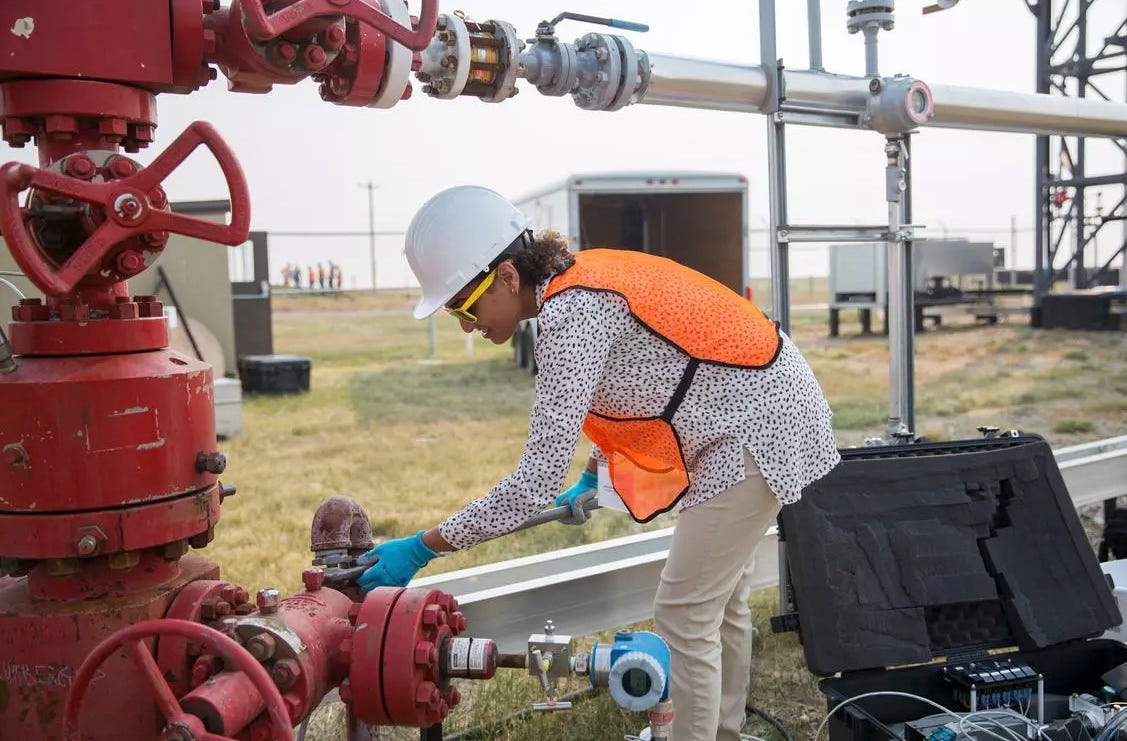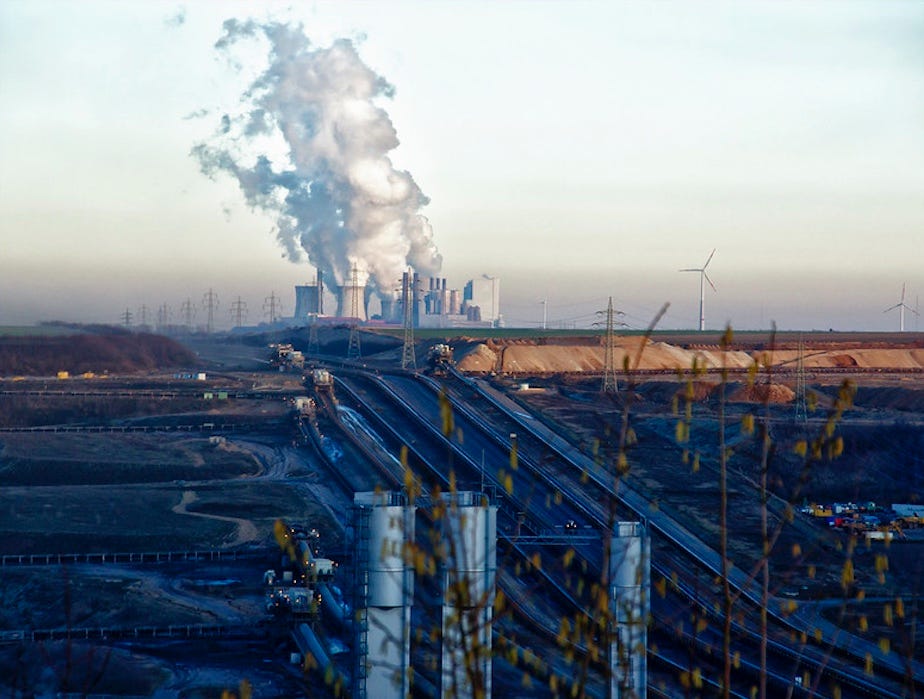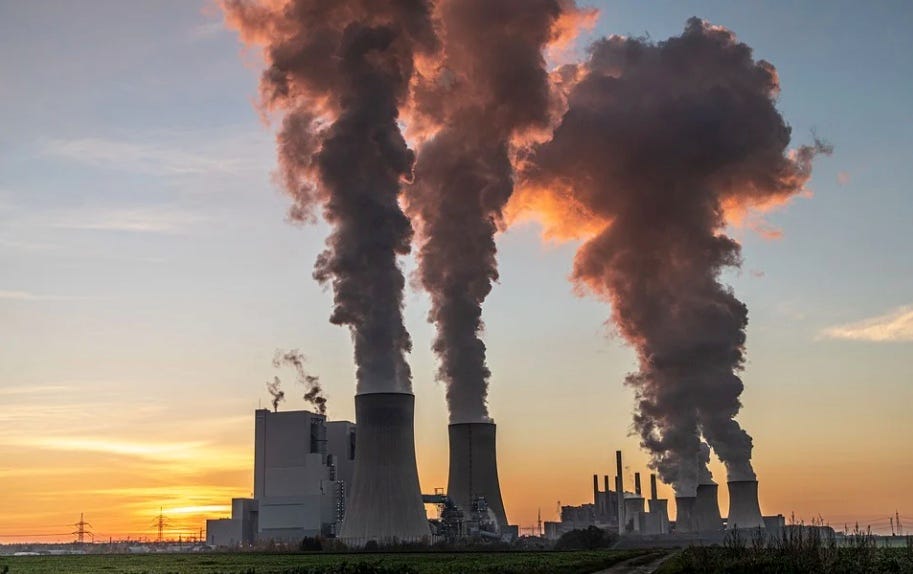Forget oil prices, chaos in metals markets holding back electric vehicle surge
Welcome to Callaway Climate Insights. Happy St. Patrick's Day. It's our second anniversary! Thanks to all our subscribers.
To read all our insights, news and in-depth interviews, please subscribe and support our great climate finance journalism. Callaway Climate Insights publishes Tuesdays and Thursdays for everybody.

The surge in oil and gasoline prices worldwide since Russia’s invasion of Ukraine should be the perfect opportunity to make the switch to that new electric vehicle you’ve seen in your neighbor’s driveway. But rollercoaster oil is nothing compared to the chaos in metals markets the past few weeks in London.
Prices of copper and nickel, which are used in EV batteries and much of which comes from Russia, have been swinging wildly since the invasion. Nickel prices doubled last week in the space of a few hours to more than $100,000 a ton, forcing the London Metals Exchange to close for several days. It reopened yesterday and prices promptly collapsed, last trading at about $41,000.
Those of you who’ve tried to buy EVs and been subjected to lengthy waits for delivery will know the frustration. As the world finally sees a chance to ditch oil and gas and help transition to renewable energy, the same supply-and-demand constraints that provide periodic oil shocks are appearing in metals.
The supply issues feed into the anti-climate argument put forth by politicians such as Sen. Joe Manchin (D-W.Va.), who came out against EVs this week, along with everything else President Joe Biden has proposed on climate. Supply chain issues, alas, are a long-term game.
Meanwhile, the eyes of the $17 trillion ESG investment world will be on the Securities and Exchange Commission in Washington next week to see if its proposed new rule on climate disclosure for public companies will be strong enough to match international standards.
More on the SEC rule, and other insights below . . . .
Don’t forget to contact me directly if you have suggestions or ideas at dcallaway@callawayclimateinsights.com.
Zeus: Two years later, climate change flipped on its head
The Climate Spiral: NASA has just released this visualization that shows monthly global temperature anomalies (changes from an average) between the years 1880 and 2021. These temperatures are based on data from NASA's Goddard Institute for Space Studies.
. . . . When we launched Callaway Climate Insights two years ago today, Covid lockdowns were just starting and ESG investing momentum was in full swing. What a difference 24 months makes, writes David Callaway. From the devastating pandemic to the Russian invasion of Ukraine, we’re thinking about our energy challenges differently now. We can’t use sanctions or send weapons against climate change, but it is still a war, and one we can still win if we use the current crisis to act quickly. . . .
Can short selling help fix climate change? The debate rages.

. . . . A raging debate over whether divestment of oil and gas stocks by large institutions actually helps prevent climate change spilled over into the controversial world of short selling this week, writes Mark Hulbert. Some of biggest names in the investing world weighed in on both sides of the argument of how shorting big stocks such as ExxonMobil (XOM) or Chevron (CVX) can or can’t move the needle in terms of shareholder action against Big Oil. And what does this have to do with cutting greenhouse gas emissions?. . . .
EU notebook: Germany falls back on coal as Russian gas crisis worsens
. . . . Europe’s frantic attempts to find more energy in the wake of Russian oil boycotts and the invasion of Ukraine led to unthinkable diversions from the push to renewable energy this week. UK Prime Minister Boris Johnson traveled to Saudi Arabia to (unsuccessfully) grub for more oil, while Germany abandoned its pledge to end coal usage by re-activating coal plants in the face of gas shortages. From Spain to Denmark, gas pipeline deals are back. Alisha Houlihan reports from Dublin. . . .
Thursday’s subscriber insights: What’s at stake in SEC climate disclosure rules meeting next week

. . . . After several delays, the Securities and Exchange Commission will propose new rules next week on climate disclosure by public companies, seeking to catch up with Europe and the UK while avoiding litigation from climate-denying politicians in Washington D.C. At stake is President Biden’s increasingly weak climate agenda, which has been battered from all sides in recent weeks. The $17 trillion investment universe tied to environmental, social and governance (ESG) strategies will be watching closely to see how tough Wall Street’s stock cop will be. Read more here. . . .
. . . . Lost in Europe’s race to grab more energy from oil and gas in the wake of Russia’s Ukraine invasion is the formal passage this week by the European bloc to impose a regional carbon border tax on imports of polluting products. The controversial tax, which Brussels argues will help reduce harmful emissions and make it more expensive for polluters, won’t go into effect until 2026. But the debate about how to implement it and who gets caught up in it begins now. . . .
. . . . Russian misinformation on social media isn’t just all about support for its invasion or U.S. midterm elections. This week it crept into a letter by GOP members of the House energy committee who alleged that Russian money was finding its way into a California environmental charity, Sea Change, and spread out to other non-profits to encourage anti-fracking advocacy. A routine fact-checking dismissed the info out of hand, but it is distressing to see it finding its way to Congress. . . .
. . . . Surging demand for electric vehicles in Europe and Asia has led to a case of EV-envy in the U.S., where narrower demand and the desire for larger cars have left consumers with less choices. That will someday change, but a lot of that will depend on fixing supply chains, as well foreign EV makers meeting tougher U.S. emissions standards. In the meantime, we’re stuck with Teslas. Read more here. . . .
. . . . Let’s face it, most of the anger around the U.S. Postal Service choosing gas-powered vans over electric ones is that the standard fossil fuel models are hideous by comparison. Some of the newer EVs in use by Amazon (AMZN), and Federal Express (FDX) and UPS are much more pleasing in design, as are the ones the Biden Administration wanted the service to choose. Don’t believe us? Take a look for yourselves right here. . . .
. . . . Join our founder and editor-in-chief David Callaway and friends at Techonomy, for an in-person full-day conference on Tuesday, March 29 in Mountain View, Calif. that brings together climate startup leaders, big company sustainability chiefs, climate tech investors, environmental justice activists and longtime climate experts for conversations on the most pressing challenges and opportunities. There will be more than 30 speakers: view the full list.
Registration includes breakfast, lunch, access to all sessions, and a closing cocktail reception. As a Callaway Climate Insights member, your ticket to Techonomy Climate is reduced to $249 (Standard price: $299). Can’t join us in person? Register for free to stream live. . . .
Editor’s picks: Coal mine methane emissions top those of oil, gas
Report: Coal mine methane emissions exceed those of oil or gas
So much methane is released from coal mining, the Global Energy Monitor says, that it exceeds the carbon dioxide emissions from burning coal at over 1,100 coal-fired power plants in China, according to a report by Phil McKenna reports for InsideClimate News. According to Global Energy Monitor, the world’s coal mines emit 52.3 million tonnes of methane per year — more than annual emissions from oil (39 million tonnes) or gas (45 million tonnes). “A slate of new coal mine projects currently under development would further emit 11.3 million tonnes of methane per year if the projects proceed as planned, and would effectively lock in new emissions equivalent to the coal-based CO₂ emissions of the U.S.,” the GEM report says. Global Energy Monitor’s analysis is, the organization says, the first assessment to estimate coal mine methane emissions worldwide at the asset level, using its newly enhanced Global Coal Mine Tracker in combination with the Model for Calculating Coal Mine Methane (MC2M). Read more of the report’s key findings.
Microsoft leads $34 million funding for startup Nautilus Labs
Nautilus Labs this week announced that it has received $34 million in Series B funding, with M12, Microsoft’s (MSFT) venture fund, and the Microsoft Climate Innovation Fund co-investing for the first time. This round brings Nautilus’s total raised capital to over $48 million. Nautilus Labs uses data and AI to increase shipping efficiencies and decarbonization efforts. The company says its collaborative flagship solution, Voyage Optimization, “is transforming how voyages are run by addressing long-standing inefficiencies and creating a pathway to lower emissions that the ocean shipping industry at-large can immediately adopt.” Nautilus Labs says Voyage Optimization “leverages machine learning-based predictions to reduce fuel waste and emissions while maximizing commercial returns by analyzing IoT data, weather patterns, arrival and departure times, and commercial needs.”
Latest findings: New research, studies and projects
Central Banks and Climate Change: Fit, Opportunity and Suitability
“In the collective endeavor to realign incentives in the fight against climate change, central banks have for a long time been absent from the equation. No longer,” write the authors of Central Banks and Climate Change. Fit, Opportunity and Suitability in the Law and Beyond. Central banks are seriously committing to the cause, they say, and promising a more climate-based focus on matters ranging from communication to prudential regulation and supervision, and including monetary policy. “This recent shift in attitudes has caught activists and critics by surprise, and resulted in an often-confusing mix of views for and against central banks’ active role in climate change, which paint such roles as (un)desirable or (i)legal, raising daunting legal (and non-legal) questions. In this paper we propose a methodology to analyze the problem, by dividing the arguments in three different types: arguments of “fit” that analyze whether central banks can tackle climate change, in light of their mandates; arguments of “opportunity” that analyze when central banks may, or should, act; and arguments of “suitability” that analyze how central banks may (and may not) intervene.” Authors: David Ramos Muñoz, Universidad Carlos III de Madrid; Antonio Cabrales, University College London, Department of Economics; Centre for Economic Policy Research (CEPR); and Anxo Sánchez, Departamento de Matemáticas, Universidad Carlos III, Leganés (Madrid).
More of the latest research:
Words to live by . . . .
“All human beings are born free and equal in dignity and rights. Yet, when it comes to the effects of climate change, there has been nothing but chronic injustice and the corrosion of human rights.” — Mary Robinson, former president of Ireland and author of Climate Justice: Hope, Resilience, and the Fight for a Sustainable Future.







